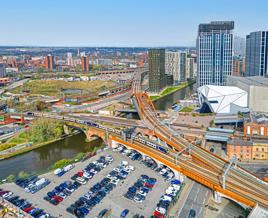Battling climate change and its effect on Network Rail’s drains, cuttings and embankments sits at the centre of the company’s five-year plan, published on April 2.
The plan covers Control Period 7, which runs from April 1 2024 to March 31 2029. NR will spend £45.4 billion to operate, maintain and renew its 20,000 miles of track, 30,000 bridges, tunnels and viaducts, thousands of signals and level crossings, and stations.
“Tackling climate change, safely improving train performance, and adapting and responding to changing commuter habits, while managing an ageing infrastructure, requires the whole industry to rally for the benefits of all rail users,” said NR Chief Executive Andrew Haines.
“While there are challenges and opportunities ahead, our mission is constant - we’re here to connect people and goods with where they need to be. The railway is part of the fabric of our everyday lives and has been for generations.”
NR gets most of its income from taxpayers via the Department for Transport and Transport Scotland.
DfT will pay £27.5bn (expressed in NR’s plan as a cash price) and TS will pay £2.3bn, with access charges from train and freight operators bringing in £13.8bn, on top of commercial income of £1.7bn.
NR’s figures include the £4.3bn it expects to spend on electricity for trains, but it charges operators the same amount.
In NR’s spending column sits operations (£4.4bn), support (£5.3bn), maintenance (£12.6bn), renewals (£19.3bn), industry costs (£2.0bn), and risk funding (£1.8bn).
NR noted that inflation had eroded £1.3bn from the sums the two governments pledged around 18 months ago, and it continues to see inflation as a challenge to its spending plans.
When DfT and TS first announced their ‘Statement of Funds Available’ (SoFA), the figures in them represented a small real-terms increase in NR funding compared with CP6 (2019-24).
But inflation now means NR has slightly less money than it had in CP6.
Robert Girgis, Policy Director of Rail Partners, representing private-sector operators, commented: “The funding is fair given the wider financial backdrop, but it still represents a real-terms reduction at a time when network performance is below what customers expect. And the impact of extreme weather on ageing infrastructure is likely to increase into the 2030s.”
With the money allocated from governments and coming from train operators, NR says that it wants to make it easier for people to choose rail and make it the “cleanest, greenest form of mass transport”. It says it wants to “continue putting passengers first and shifting more goods by rail” and pledges to invest in the skills of its employees.
To deliver this, NR plans to focus renewals work on assets that would have the most impact on passengers and freight if they failed. It says it will invest more in maintenance and remote monitoring to better predict and prevent failures.
Its CP7 plan says it will spend £2.8bn to “protect our most susceptible assets, in particular earthworks and drainage”. And it says it will better manage lineside vegetation to cut the risks of trees falling onto tracks.
NR also says it will change the way it plans engineering work to reflect changing travel patterns by passengers. This is likely to mean longer planned closures and more weekday rather than weekend closures.
A full version of this feature complete with a breakdown of regional plans appears in issue 1007 of RAIL. Get your copy delivered to your letterbox or inbox.
















Login to comment
Comments
No comments have been made yet.